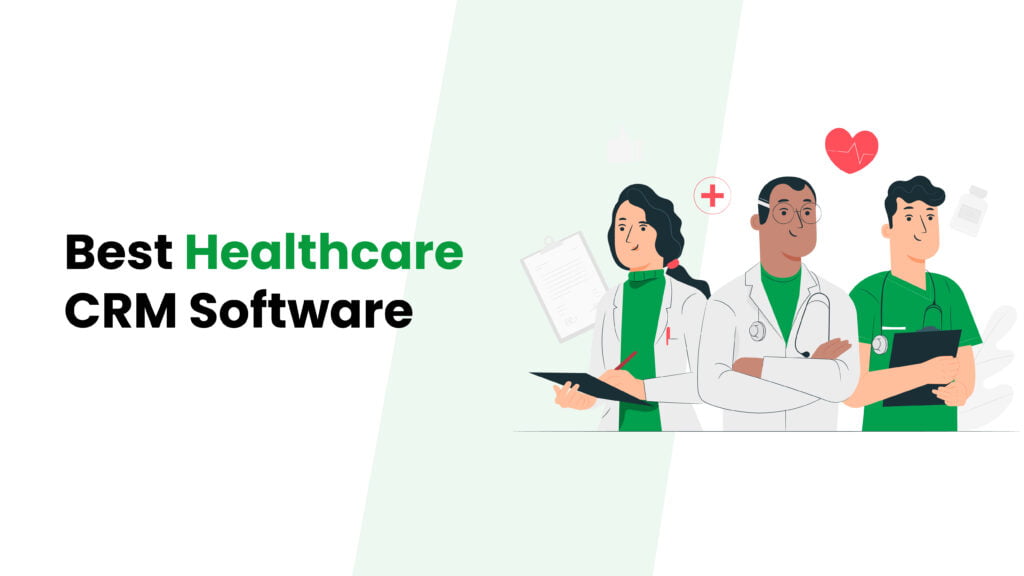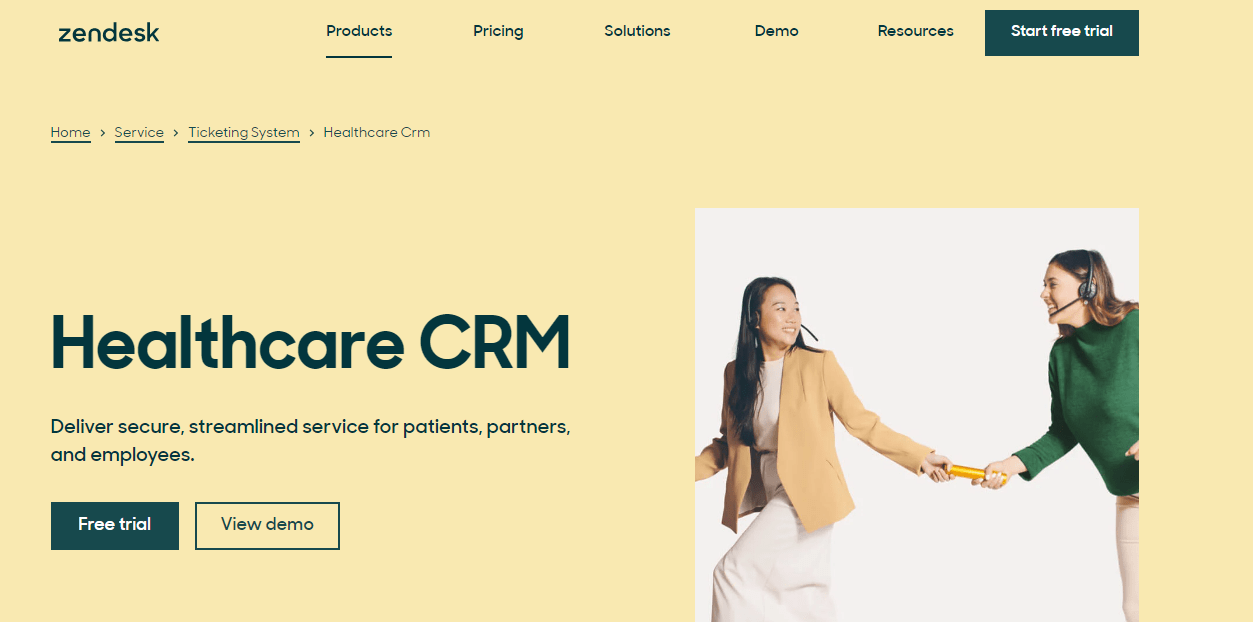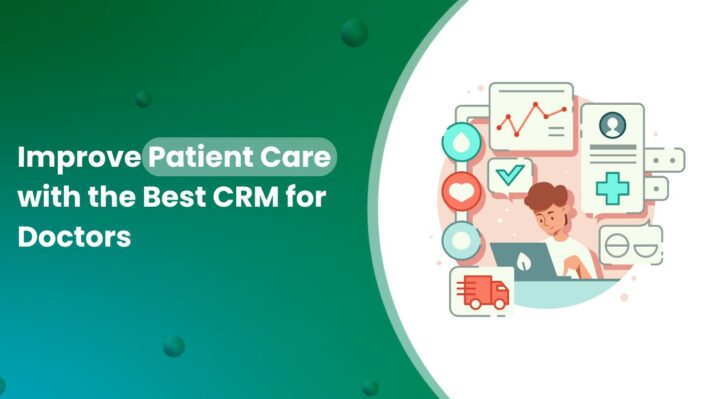Best Healthcare CRM Software For Patient management

Ever wondered how your doctor’s office keeps track of all those appointments, medical records, and follow-ups? Well, let’s talk about that for a minute. You know, the healthcare industry has come a long way from the days of paper files and appointment books. These days, doctors, hospitals, and clinics are dealing with more patients than ever before.
to keep everything organized, improve patient care, and even boost the efficiency of healthcare providers. Well, that’s where healthcare CRM software comes.
In this blog, we’re going to dive into some of the best Healthcare CRM software out there. We’ll look at how they’re changing the game in patient management and why they’re becoming a must-have tool in modern healthcare.
What is Healthcare CRM Software?
Healthcare CRM software is a specialized solution designed to help medical service providers manage patient relationships and improve their operations. This type of software enables healthcare organizations to store and organize patient information securely, while also enhancing patient engagement and streamlining various processes.
At its core, a healthcare CRM system acts as a centralized database for patient data. It typically includes information such as appointment schedules, medical histories, and billing records. This comprehensive view of patient information allows healthcare providers to deliver more personalized and efficient care.
The best healthcare CRM software can:
- Store patient information securely
- Schedule appointments easily
- Send reminders to patients about check-ups or medications
- Keep track of patient interactions and medical history
- Help with billing and insurance claims
- Provide insights to improve patient care
Benefits of using a Healthcare CRM Software
Healthcare CRM software offers a multitude of benefits that can transform how medical professionals and hospitals manage their practices and interact with patients. Here are some key advantages:
1. Improved Patient Management
Healthcare CRM systems centralize patient information, making it easier to track medical histories, appointments, treatments, and follow-ups. This ensures that doctors have comprehensive, up-to-date information at their fingertips.
2. Streamlined Operations
With Healthcare CRM software, administrative tasks such as scheduling appointments, managing billing, and coordinating between departments are streamlined. This reduces the administrative burden on healthcare staff, allowing them to focus more on patient care.
3. Data Security and Compliance
Healthcare CRM systems are designed to comply with industry regulations like HIPAA, ensuring that patient data is stored securely and confidentially. This reduces the risk of data breaches and helps maintain patient trust.
4. Better Patient Engagement
CRM software provides tools like integrated email marketing for engaging patients through personalized health tips, reminders for check-ups, and tailored communication based on their medical history. Engaged patients are more likely to follow their treatment plans and maintain regular contact with their healthcare providers.
5. Increased Efficiency
Automating routine tasks with CRM software reduces errors and increases efficiency. Healthcare providers can quickly access patient records, reducing wait times and improving the overall patient experience.
6. Data-Driven Insights
Healthcare CRM software offers analytics and reporting features that help providers gain insights into patient behaviors, treatment outcomes, and operational efficiencies. These insights can be used to make informed decisions and improve healthcare delivery.
7. Enhanced Patient Retention
By providing personalized care and maintaining consistent communication, healthcare CRM software helps in retaining patients. Satisfied patients are more likely to return for future care and recommend the healthcare provider to others.
Key features of Healthcare CRM Software
Healthcare CRM software, often referred to as medical CRM, is packed with features designed to improve patient care and streamline healthcare operations. Here are some key features to look for:
Patient Information Management
A core feature of healthcare CRM is the ability to store and manage comprehensive patient records. This includes medical histories, treatment plans, medications, and appointment schedules, ensuring that all patient information is easily accessible and up-to-date.
Appointment Scheduling and Reminders
Healthcare CRM systems offer robust appointment scheduling capabilities. They allow patients to book appointments online and send automated reminders to reduce no-shows. This feature is essential for maintaining a smooth workflow in busy practices.
Communication Tools
Effective communication is vital in healthcare. CRM for doctors includes tools for sending automated appointment reminders, follow-up messages, and health tips via email or SMS. These tools help maintain regular communication with patients and enhance their overall experience.
Secure Data Storage and Compliance
Medical CRM software is designed to comply with regulations such as HIPAA, ensuring that patient data is stored securely and confidentially. This feature is crucial for protecting sensitive information and maintaining patient trust.
Analytics and Reporting
Healthcare CRM systems provide detailed analytics and reporting features. These tools help healthcare providers gain insights into patient behaviors, treatment outcomes, and operational efficiencies, enabling data-driven decision-making.
Marketing Automation
CRM for doctors includes marketing automation tools to help healthcare providers reach out to potential and existing patients. These tools can automate email campaigns, manage social media interactions, and track the effectiveness of marketing efforts.
Customizable Dashboards
Customizable dashboards provide healthcare providers with a snapshot of their practice’s performance. They can monitor key metrics such as patient volumes, appointment schedules, and financial performance at a glance.
Task Management
Task management features help healthcare teams stay organized by assigning tasks, setting deadlines, and tracking progress. This ensures that all tasks are completed efficiently and on time.
Some Top Rating Healthcare CRM Software
1. SalesTown Healthcare CRM Software: A Complete Solution for Patient Management

Introduction:
SalesTown is a cloud-based CRM solution that can also be used in the healthcare industry, including hospitals, clinics, medical practices, and other healthcare organizations. It helps streamline and manage patient relationships, appointments, billing, and other operational tasks.
Features:
- Patient Management
- Appointment Scheduling
- Billing and Insurance
- Patient Communication
- Reporting and Analytics
- Integration with medical software
Pricing:
SalesTown offers customized pricing based on the number of users and required features. The pricing starts at $4.9 user per month
HIPAA Compliance:
Yes, SalesTown is HIPAA-compliant. It includes data encryption, secure hosting, access controls, audit trails, and regular security risk assessments.
2. Salesforce Health Cloud: Leading Healthcare CRM Software for Patient Care

Introduction: A powerful and customizable CRM built specifically for the healthcare industry. It can handle everything from patient engagement to managing referrals.
Features:
- In-depth patient profiles
- appointment scheduling
- task management
- reporting & analytics
- patient portal
- strong integrations with other healthcare software
Pricing: Customizable plans based on features and users, typically starting around $150 per user per month.
HIPAA Compliance: Yes, Salesforce Health Cloud offers HIPAA compliance features.
3. Leadsquared Healthcare CRM Software: Streamlining Lead Management in Healthcare

Introduction: A marketing automation-focused CRM that’s great for attracting new patients and nurturing leads.
Features:
- Email marketing tools
- landing page builder
- lead scoring (helps prioritize leads)
- marketing automation
Pricing: Tiered plans start around $25 per user per month.
HIPAA Compliance: Yes, Leadsquared offers HIPAA compliance features.
4. Zoho CRM: Affordable and Efficient Healthcare CRM Software for Clinics

Introduction: A well-rounded CRM with a good balance of features for sales, marketing, and customer service.
Features:
- Contact management
- pipeline management
- email integration
- reporting & analytics
- healthcare-specific features like appointment scheduling.
Pricing: Tiered plans start around $12 per user per month.
HIPAA Compliance: Zoho offers a separate HIPAA-compliant version of their CRM for an additional cost.
5. Zendesk Healthcare CRM Software: Enhancing Customer Support in Healthcare

Introduction: A CRM focused on improving patient experience and customer service.
Features:
- Ticketing system for managing patient inquiries
- self-service patient portal
- knowledge base for patients
- reporting tools to track patient satisfaction.
Pricing: Tiered plans start around $19 per agent per month.
HIPAA Compliance: Zendesk offers HIPAA compliance features as an add-on.
Key Benefits of Using SalesTown’s Healthcare CRM
SalesTown CRM is a user-friendly software that helps you manage everything related to your patients, from appointments and medical records to communication and billing. Here’s a breakdown of its key features along with examples to illustrate their benefits:
Lead Management: This feature helps healthcare organizations track and manage potential patients or clients. For instance, if a new patient calls to inquire about services, their information can be entered into the CRM as a lead, and the system can automatically follow up with them through personalized emails or phone calls.
Patient Management: This feature allows healthcare providers to keep track of patient information, such as contact details, medical history, appointments, and treatment plans, all in one place. For example, doctors can easily access a patient’s records to review their medical history and make informed decisions about their treatment.
Appointment Scheduling: With this feature, healthcare professionals can efficiently schedule and manage appointments for patients. They can easily see available time slots, book appointments, and send reminders to patients. For instance, a receptionist can quickly schedule a follow-up appointment for a patient and send them a reminder via email or WhatsApp.
Electronic Health Records (EHR) Integration: SalesTown’s Healthcare CRM seamlessly integrates with electronic health record systems, allowing for easy access to patient records directly within the CRM platform. For example, doctors can view lab results and prescription history without switching between different systems.
Lead and Referral Tracking: This feature helps healthcare organizations track leads and referrals, whether it’s from other healthcare providers, marketing campaigns, or word-of-mouth. For instance, a hospital can track referrals from local clinics and follow up with those patients to schedule appointments.
Integrate Patient Portal: This secure online platform integration allows your patients to access their own medical information, including appointment history, lab results, and billing statements.
Example: Patients can conveniently view their upcoming appointments, download medical records, etc. saving them time and hassle.
Customizable Reporting and Analytics: This feature allows healthcare organizations to generate custom reports and analyze data to gain insights into patient demographics, appointment trends, and marketing effectiveness. For instance, a hospital administrator can create a report to analyze the number of patients seen each month and identify areas for improvement in scheduling efficiency.
HIPAA Compliance: SalesTown’s Healthcare CRM is designed to meet HIPAA (Health Insurance Portability and Accountability Act) compliance standards, ensuring the security and privacy of patient information. For example, all patient data is encrypted and access is restricted to authorized personnel only.
SalesTown CRM helps you focus on caring for patients. Not chasing paperwork. Sign up today for a free Demo to see how SalesTown CRM can help your healthcare business. It is designed to save you time, organize operations, and build trust with patients.
Try it out for yourself now! It only takes minutes to 👉 get started today.
Some FAQS related to Healthcare CRM Software
Q. What is Healthcare CRM software?
Q. Why SalesTown is the top choice for healthcare CRM Software?
Q. How can Healthcare CRM improve patient care?
Q. Is healthcare CRM software HIPAA compliant?

